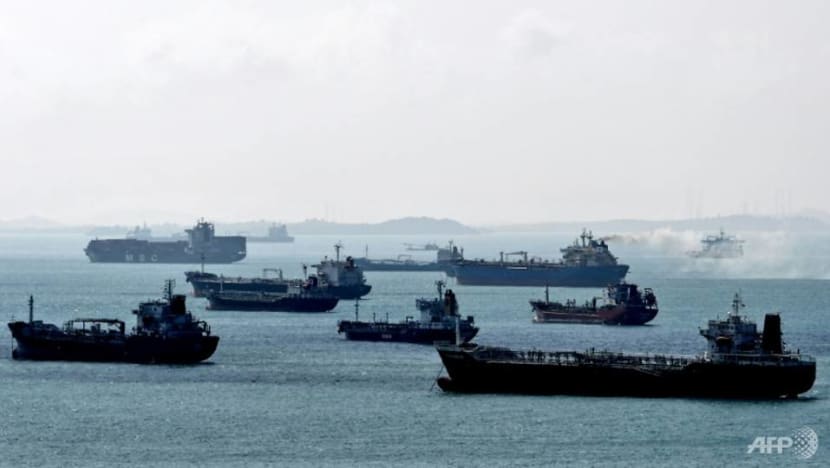‘We have to move beyond being oil traders’: What Singapore’s future as an oil hub could look like in a post COVID-19 world
Consolidation and transformation is vital to Singapore’s survival as an oil hub in a post COVID-19 world, say industry watchers.

Oil tankers are anchored off the western shores of Singapore. (Photo: AFP/Roslan Rahman)
SINGAPORE: It has been a terrible few months for the oil industry.
The demand for crude oil, already reeling from the impact of last year’s trade war between China and the United States, declined even further as the COVID-19 pandemic spread across the world.
Then Russia and Saudi Arabia sparked off a potential oil price war by refusing to come to an agreement on production levels.
And with most of the world in some form of lockdown and fewer people going to work and hardly anyone flying, the demand for fuel has been hit very hard.
As a result, US oil prices went into negative territory for the first time in history last month amid the deepest fall in demand in 25 years.
And this in turn has hit the oil trading sector in Singapore.
READ: Commentary - Even with low prices, this is not the end of oil
READ: What is a negative crude future and does it mean anything for consumers?
“This is an unprecedented time for the oil sector and the oil trading sector is not immune to this,” said Mr Ravi Krishnaswamy, senior vice president for energy, sustainability and industrial (APAC) at Frost & Sullivan. He estimates that demand for crude oil has been decimated by anywhere between 20 to 30 per cent per day.
“THESE INDUSTRIES COULD BE IMPACTED BY CONTAGION EFFECTS: MAS"
In its latest half-yearly macroeconomic review, the Monetary Authority of Singapore raised concerns over the wholesale trade of fuels, citing the size of the industry.
In 2018, wholesale trade of fuels generated an operating surplus of S$13 billion, accounting for 4.7 per cent of Singapore’s total gross operating surplus.
MAS also noted in its report that the fuels wholesaling industry is likely to have strong linkages with other industries such as petroleum refining, transportation and storage, petrochemicals manufacturing and finance.
It warned that "these industries could be impacted by contagion effects" if the situation worsens.
READ: Pricing the benefits of cheap oil in a world of economic lockdowns
Industry watchers such as Sharad Somani said that this stress has meant that some companies "which were not necessarily well-managed, or did not have robust risk systems or governance frameworks, have defaulted".
“There are more than 130 companies in Singapore which are in this sector and all of them have their lines of credit with banks,” said Mr Somani, who is head of infrastructure at KPMG Asia Pacific.
“The worry would be that just because a few have failed, the banks start pulling the loans from others, which [would] lead to a contagion effect of those firms also failing.”
READ: Commentary - Hin Leong's financial woes suggest oil traders haven't learnt their lessons
Things came to a head when home-grown oil trader Hin Leong Trading filed for bankruptcy protection last month.
To make matters worse, reports came to light that founder Lim Oon Kuin had directed the firm to hide nearly US$800 million in losses from speculating oil futures over the years.
In response, MAS said in a joint statement with Enterprise Singapore and the Maritime and Port Authority of Singapore that Hin Leong’s financial woes would have "no serious impact" on Singapore’s oil trading and bunkering sectors.
READ: Police investigating debt-laden oil trader Hin Leong Trading: What we know so far
“A PRICE TO PAY WHEN THINGS GO DOWN”
Although there is some concern about Singapore’s reputation as a commodity trading hub, many analysts are confident of its resilience.
Mr Avtar Sandu, senior commodities manager at Phillip Futures said that most companies are, in general, run well.
“The issues were really company specific," said Mr Sandu, referring to Hin Leong.
"Most of the other companies I would say, are very well run companies. It is like that - if you are heavily leveraged, if you take more risk than you need, then there’s often a price to pay when things go down,” he said.
READ: Singapore will enter a recession this year, ‘significant uncertainty’ over duration and intensity: MAS
Others such as Frost & Sullivan’s Mr Krishnaswamy said that regardless of the industry they belong to, companies will fail for a variety of reasons during a downturn.
“You need more regulatory oversight, more demand for corporate governance,” he said.
Mr Krishnaswamy added: “There could be more consolidation and maybe the smaller unviable guys, the margin players might lose out. Either they have to exit the business, exit the market or they get subsumed by larger players.”
In the latest such sign, HSBC has filed an application to place Singapore-based oil trader Zenrock under judicial management.
READ: Commentary: Is low growth the new normal for Singapore?
Still, in the long run, most experts are optimistic about Singapore’s ability to recover.
“The conditions or the factors that actually cause us to grow are still there, taking COVID-19 aside,” said Phillip Futures’ Mr Sandu.
“We have a highly liquid dollar market here and we have very favourable policies that would allow all these companies to grow here and all these factors are still there,” he said.
READ: Commentary - The heavy lifting needed to get Singapore through the COVID-19 slump
But the true turning point in the decline for oil demand would be the speed and efficiency in which countries come out of their lockdowns.
“Are enough people coming out? Are they using their cars? Are they travelling to work?” said Frost & Sullivan’s Mr Krishnaswamy.
“We are not going to see huge leisure travel yet, but even travel for necessity, travel to work, I think travel for key critical functions has to come back. And if that comes back and we don’t see a second wave then probably the worst for the oil market might be behind us,” he said.
Going one step further, KPMG’s Mr Somani said that the future for Singapore lies in evolving from an oil trading hub into an energy trading hub.
“Thanks to renewable energy, energy efficiency and climate change concerns, oil is going to decline in consumption over the next two decades,” said Mr Somani.
“We have to move beyond being oil traders to become energy traders or new energy traders. And as long as Singapore can aspire and prepare the groundwork for creating a proper energy ecosystem, we would be able to continue to sustain our status as an energy hub rather than only an oil hub,” he said.















